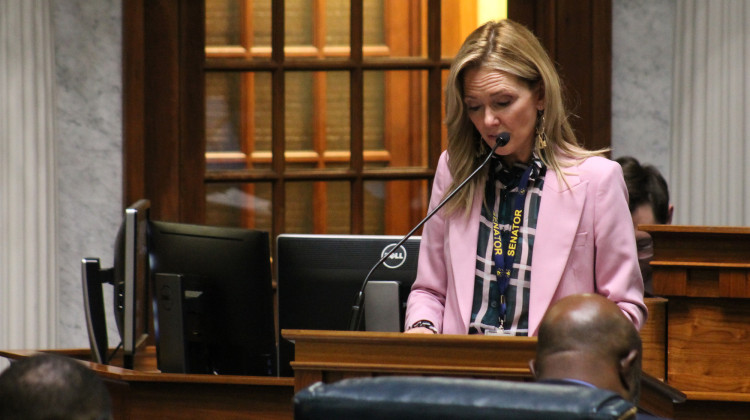
Sen. Shelli Yoder (D-Bloomington) said the bill would micromanage civics education.
Lauren Chapman / IPB NewsA controversial civics bill that would promote “fostering a national identity” by teaching some topics and prohibiting others received little support from a Senate committee Wednesday. The bill’s author said his goal is to instill pride for their country in young Americans. But the bill’s opponents say it will prevent teachers from educating students about some significant historic events.
SB 257 says civics courses must “foster a national identity” by teaching principles from the Bill of Rights, the Declaration of Independence and the United States Constitution. That includes ideals like limited government, individual liberty and separation of powers, among others.
Sen. Spencer Deery (R- West Lafayette), the bill’s author, said it is necessary because young Americans don’t have pride in their country. He cited a study linked to the Cato Institute, a libertarian think tank.
“Only 39 percent are grateful for America’s founding. Flip that around and you get six in 10, or a majority, who essentially oppose the founding of America,” he said. “More than half favor writing a new Constitution, and four in 10 consider our founding fathers more as villains than heroes.”
Deery said some civics curriculums teach students to look at the country’s history in a negative light and place more emphasis on its mistakes than its ideals. He said this bill would prevent those curricula from being taught in Indiana schools.
“This is an issue that keeps me up at night, perhaps more than any other, because if the next generation is not cherishing the founding principles that we view and derive our liberties from, what’s going to happen to our country? What’s going to happen to our nation?” he said.
In addition to specifying which principles civics teachers must teach, the bill also prevents them from “fostering a national identity” around racial and gender discrimination, victimization, class struggle, privilege or systemic exclusion.
The bill’s opponents say the language is vague. They worry it will have a chilling effect that will prevent teachers from discussing history like segregation or slavery.
David Marcott, executive director of the Urban Schools Association, testified against the bill.
“Teachers and parents and community members will be confused as to the purpose of this language,” he said. “They may interpret this language as not learning about the Civil Rights Movement, the woman’s suffrage movement, reasons workers established unions.”
Randy Hudgins, a U.S. history teacher at Warren Central High School, said he is worried about the potential repercussions of teaching about certain topics if the bill becomes law.
"There’s no protection for the teacher who teaches the history of racial discrimination and gender discrimination inherent in the Declaration [of Independence]. How do I answer a Black male who asks me what the phrase, ‘All men are created equal,’ what that means and what is behind that?" Hudgins said. "I teach students who mostly do not look like me. How do I answer the young female student’s question about why is it all men are created equal? How do I address that without getting into hot water and having my license potentially revoked?"
The bill would also require public schools to create a procedure for parents and community members to request school boards or charter school authorizers to investigate if they believe teachers are not following the law.
If a parent or community members wishes to appeal a school board or authorizer’s findings after an investigation, the appeal must be reviewed at board or authorizer’s next public meeting.
READ MORE: How do I follow Indiana’s legislative session? Here’s your guide to demystify the process
Join the conversation and sign up for our weekly text group: the Indiana Two-Way. Your comments and questions help us find the answers you need on statewide issues, including our project Civically, Indiana and our 2025 bill tracker.
Democratic lawmakers also pushed back on the bill.
“The original text of the Constitution talks about the enslavement of people. In fact, it mentions the Three-Fifths [Compromise].” said Sen. J.D. Ford (D-Indianapolis). “How can you teach that concept if you are trying to stay within the boundaries of your bill?”
Sen. Fady Qaddoura (D-Indianapolis) said people can have pride for their country while also acknowledging past problems.
“We can celebrate America, the greatest nation on Earth that contributes to the well-being of the entire globe, without taking anything away from the people who helped build the nation, who fought in the Revolution, who fought in the Civil War, who led the Civil Rights Movement,” he said. “They are part of the nation; they are part of the culture. They are part of the heritage.”
Deery said the purpose of that portion of the bill is not to prohibit discussion about certain topics but to reframe how they are discussed.
“It’s not saying you can’t teach these things. It’s simply saying, what is the framework you’re teaching them in?” he said. “Is America good, or is it not? Is American aspiring to reach these values, or is it not? I reject the idea that you can’t cover some of our shortcomings without a way that doesn’t revere the founding principles of our country.”
Sen. Shelli Yoder (D-Bloomington) said she disagrees with the idea that younger generations have less pride for their country.
“I’m going to stick up for Gen Z and say they do love their country. And it is their approach, their questions, their insight, their engagement of things that are new that weren’t around when I was a kid, that challenges me, challenges us all,” she said.
Additionally, Yoder questioned Deery’s use of data from the Cato Institute. She said the principles listed in his bill are also listed on the Cato Institute’s website.
“I just think it’s really interesting that you used statistics from the Cato Institute — which is a libertarian think tank, a bastion of libertarianism — and then you list their values,” she said. “If you go to their website, those are some of the ones they say they stand for, in a bill that is so micromanaging, in a bill that is so not limited government. It is so contradictory.”
The committee expects to vote on the bill next week.
Kirsten is Indiana Public Broadcasting's education reporter. Contact her at kadair@wfyi.org or follow her on Twitter at @kirsten_adair.
 DONATE
DONATE






 Support WFYI. We can't do it without you.
Support WFYI. We can't do it without you.